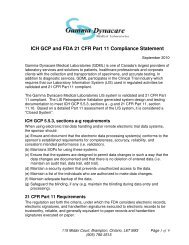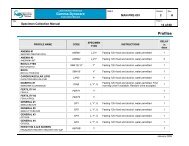HPV Fact Sheet [PDF] - Gamma-Dynacare
HPV Fact Sheet [PDF] - Gamma-Dynacare
HPV Fact Sheet [PDF] - Gamma-Dynacare
You also want an ePaper? Increase the reach of your titles
YUMPU automatically turns print PDFs into web optimized ePapers that Google loves.
GAMMA-DYNACARE MEDICAL<br />
LABORATORIES<br />
Contact us:<br />
Toronto: 1.800.668.2714<br />
Ottawa: 1.800.267.9514<br />
London: 1.800.265.5946<br />
Montreal: 1.800.697.3831<br />
Other locations: 1.800.668.2714<br />
www.gamma-dynacare.com<br />
<strong>HPV</strong> FACT SHEET<br />
WHAT IS <strong>HPV</strong>?<br />
There are over 100 different types of the Human Papillomavirus (<strong>HPV</strong>), a virus<br />
most commonly known to cause warts on the hands and feet. Some types of<br />
<strong>HPV</strong> infect the genital tract. Genital <strong>HPV</strong> types are sexually transmitted and can<br />
cause external genital warts or cell changes on the cervix that increase a<br />
woman’s risk for cervical cancer.<br />
Most <strong>HPV</strong> infections do not result in genital warts or cervical disease and a<br />
healthy immune system will often suppress or clear the virus. Most people don’t<br />
even know they have the virus.<br />
Cervical Cancer and <strong>HPV</strong>: Key <strong>Fact</strong>s<br />
♀ Cervical cancer is the 3 rd most common cancer in women worldwide preceded<br />
by breast and skin cancer.<br />
♀ In 2006, it is estimated that 1,350 new cases will be diagnosed and 390<br />
deaths will occur in Canada.<br />
♀ Cervical cancer is a preventable disease if detected and treated early.<br />
♀ Certain high-risk strains of <strong>HPV</strong> cause cervical cell changes, which, over a<br />
period of time, can develop into cancer if untreated.<br />
♀ Testing for these high-risk <strong>HPV</strong> strains helps to resolve the questions and<br />
concern associated with an uncertain/ASCUS (Atypical Squamous Cells of<br />
Undetermined Significance) Pap test result.<br />
The Pap test and <strong>HPV</strong> test<br />
The Pap test, or smear, is a common screening test used to find signs of cervical<br />
cancer or cells that may turn into cancer cells in the future. If you have had an<br />
uncertain/ASCUS Pap test result, you are probably wondering exactly what it<br />
means. Like many women, you may be concerned about cervical cancer.<br />
Generally, an ASCUS result means that some abnormal cells are present,<br />
however, their significance is not clear. This sort of result might indicate precancerous<br />
or simply benign changes.<br />
While there are a number of reasons why a Pap test result may be reported as<br />
ASCUS, there is a test that can accurately detect the presence of the virus that<br />
causes cervical cancer. This <strong>HPV</strong> test helps to resolve the uncertainty.
GAMMA-DYNACARE MEDICAL<br />
LABORATORIES<br />
Contact us:<br />
Toronto: 1.800.668.2714<br />
Ottawa: 1.800.267.9514<br />
London: 1.800.265.5946<br />
Montreal: 1.800.697.3831<br />
Other locations: 1.800.668.2714<br />
www.gamma-dynacare.com<br />
<strong>HPV</strong> Testing: What you need to know<br />
How does the <strong>HPV</strong> test help?<br />
The <strong>HPV</strong> test helps to resolve the questions and uncertainty around an ASCUS<br />
Pap test result. This, in turn, helps to make clear for you and your physician<br />
the most appropriate next steps in your care.<br />
♀ A negative result means that high-risk, cancer-causing strains of <strong>HPV</strong> were<br />
not detected and therefore, you have little or no risk of developing cervical<br />
cancer before your next routine visit.<br />
♀ A positive <strong>HPV</strong> result means that one or more high-risk strains of <strong>HPV</strong> were<br />
detected. It does not mean that you have cervical cancer. A positive <strong>HPV</strong><br />
result means an increased risk of developing cervical cancer. Further<br />
examination is needed to see if there are pre-cancerous or cancerous<br />
changes. If no changes are detected, you will be closely monitored to make<br />
sure that any future changes are detected as early as possible. If cervical<br />
disease is present, highly effective treatment options are available.<br />
Benefits of <strong>HPV</strong> testing to women with uncertain Pap results<br />
♀ Women who test positive for high-risk <strong>HPV</strong> strains are treated appropriately<br />
to prevent progression of disease.<br />
♀ The result is early and effective management of disease.<br />
♀ Women who test negative for high-risk HP strains are monitored more<br />
conservatively, decreasing the need for repeat office visits.<br />
♀ There is a sharp reduction in diagnostic uncertainty and unnecessary<br />
patient anxiety.<br />
♀ Unnecessary invasive procedures and their associated discomfort and<br />
costs are minimized.<br />
Payment and Insurance<br />
The test may not be currently covered by your government health insurance<br />
plan. But it may be covered by your supplementary health insurance or<br />
extended health care plan (i.e., coverage through your employer).<br />
** For more information on cervical cancer, the Pap test or the <strong>HPV</strong> test,<br />
please speak with your healthcare provider.


![HPV Fact Sheet [PDF] - Gamma-Dynacare](https://img.yumpu.com/20971907/1/500x640/hpv-fact-sheet-pdf-gamma-dynacare.jpg)




![Is It Allergy? [PDF] - Gamma-Dynacare](https://img.yumpu.com/20948568/1/190x146/is-it-allergy-pdf-gamma-dynacare.jpg?quality=85)
![CLP025-Guideline for Reporting Laboratory Test Results [PDF]](https://img.yumpu.com/20906377/1/190x245/clp025-guideline-for-reporting-laboratory-test-results-pdf.jpg?quality=85)

![Critical Values-Quebec [PDF] - Gamma-Dynacare](https://img.yumpu.com/20892076/1/190x245/critical-values-quebec-pdf-gamma-dynacare.jpg?quality=85)



